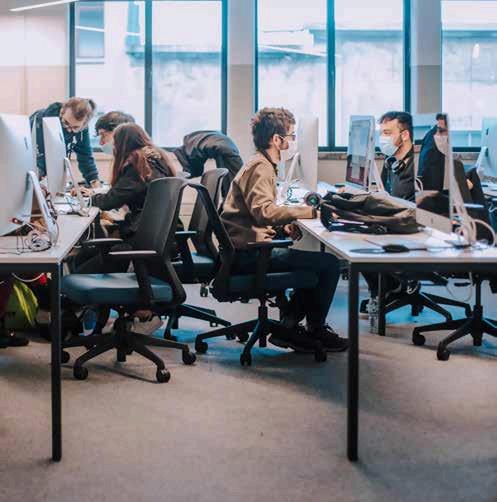
5 minute read
Employer Branding: the continuous commitment to people
from amorim news 22/09
by ecomat
Employer Branding: the continued commitment to people
In a particularly dynamic labour ecosystem, it is increasingly challenging for companies to attract, capture and retain talent. At Corticeira Amorim - a company marked by family culture and pragmatism, but also by ambition and daring - Employer Branding is now a common practice. The company recently won third place in the Industrial Companies category of Randstad’s “Employer Brand Research 2022” ranking.
How is team spirit built and kept alive in a company that has a history that spans more than 150 years, is the leader of its sector, in a work environment in which four generations currently work together (Baby-boomers, X, Millennials and Z)? How will the company’s culture evolve in an increasingly competitive context, in which people management is constantly being updated, in order to respond to the challenges of new global paradigms of work? How is the company positioned and differentiated in the market, vis-à-vis other employers and potential new employees? Alexandra Godinho, Corticeira Amorim’s Human Resources Director, explains: “Our employer brand has evolved significantly over recent years. Although we are not a mass-market retailer, we have clearly increased our notoriety, both due to the company’s good results and the fact that we have started to communicate with the outside world in a more intentional manner”. This perception has been confirmed by the good results obtained by Corticeira Amorim in the “Employer Brand Research” ranking – winning third place in the Industrial Companies category in 2022, and first place in 2021. This is a worldwide survey that Randstad carries out every year, that was carried out in Portugal in January 2022, with a sample of about 5,000 people, between 18 and 60 years old, representative of the Portuguese population. The respondents were asked which companies they consider to have better attributes in certain categories, making it possible to trace a picture of how organisations are perceived, in terms of being more or less desirable. Feet on the ground and head in the clouds What is the culture that characterises Corticeira Amorim, and which at least partly contributes to the manner in which the company is positioned and perceived? “If I had to highlight one aspect of our corporate culture, it would be pragmatism. Our top management has publicised the idea: we have to make things happen. That’s why we need people who are very focused on achieving things”, remarks Alexandra Godinho. “When I say that we must have our feet on the ground and our heads in the clouds, I mean we need pragmatism, and also our characteristic drive and ambition, looking upwards. Head in the clouds, in the sense of dreaming big”.





In a company with a history that spans more than 150 years, it is complementarity between different attributes that makes the key difference in the construction of the employer brand. “We feel that there is indeed an evolution in terms of Employer Branding. Corticeira Amorim was previously perceived as primarily a safe, stable and traditional family business. Today the brand stands out for its good results, as a leading Portuguese company internationally, due to its sustainability credentials”, remarks Corticeira Amorim’s Human Resources director. “Today, the new generations value sustainability. Sustainability projects us, it’s a great argument”, she concludes.However, these attributes are not sufficient in their own right. The secret is literally the people: “We are increasingly realising that our reputation and our brand as an employer are linked to people’s concrete experiences. The main source of Employer Branding is the people who work here. It is their concrete experience as employees that determines whether they will recommend us in their network of contacts”, she sums up.
An intergenerational human landscape At Corticeira Amorim, the recruitment of young people is a clear objective. Therefore, the human resources team strives to recruit young people in a differentiated way, strengthening links and partnerships with higher educiation institutions and developing internship programmes. To a large extent, our trainee programmes have fuelled the recruitment of Corticeira Amorim technical staff over recent years and have made a fundamental contribution to the company’s employer brand. However, the company’s commitment to young people does not undermine our appreciation of more experienced generations. The uniqueness of Corticeira Amorim’s human landscape resides in striking this balance: “Right now we have this mix of four different generations in our work context. Our organisational and technological evolution has delivered profound changes. We have managed to evolve, even introduced changes in terms of the human landscape”, summarises Alexandra Godinho. “Today we only recruit new employees who have completed their secondary school education, Year 12, but at the same time we are also retraining the people who have already worked here for much longer”. Technological evolution requires permanent updating. At Corticeira Amorim, the digital transition and the introduction of new technologies and processes across all business units, has conditioned the workforce. “The company’s growth has enabled us to absorb this impact, identify new roles for people and reconvert others, through training that enables them to learn more in certain fields and strengthen their skills”. Updating skills is imperative: “In order to be able to respond to this paradigm shift, we will have to continue our commitment to people, because what they know today is highly likely to become obsolete within a few years. People need to be constantly learning”. New leadership challenges New leadership and people management challenges arise in the post-pandemic context. Changes to the social environment and the entry of new generations into the job market has substantially altered the rules of the game. Teleworking is becoming a major trend. People need to strike the right work-life balance, since many people are no longer looking for a job for life and are increasingly available to change. This creates tremendous challenges for companies, especially in terms of the retention of talent. “The places may even be the same”,explains Alexandra Godinho. “But the chairs are always changing. There is a new generation in the job market that is clearly operating under a different paradigm. They collect experiences, they want to experience things now, and don’t want to wait for something in the distant future. It is a generation that probably has a much healthier relationship between work and other areas of their lives. It is a very focused generation, with tremendous productivity when focused and motivated. During the time they are working with us, they are in fact, entirely dedicated to us”.













